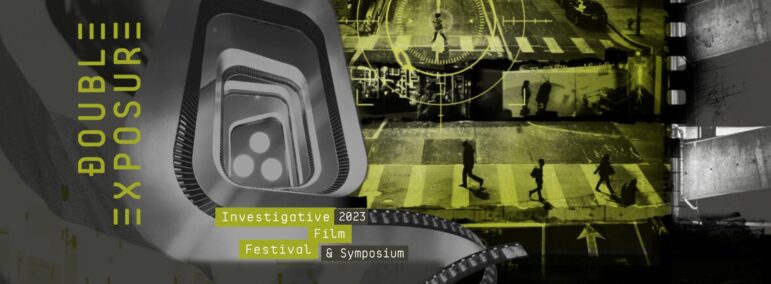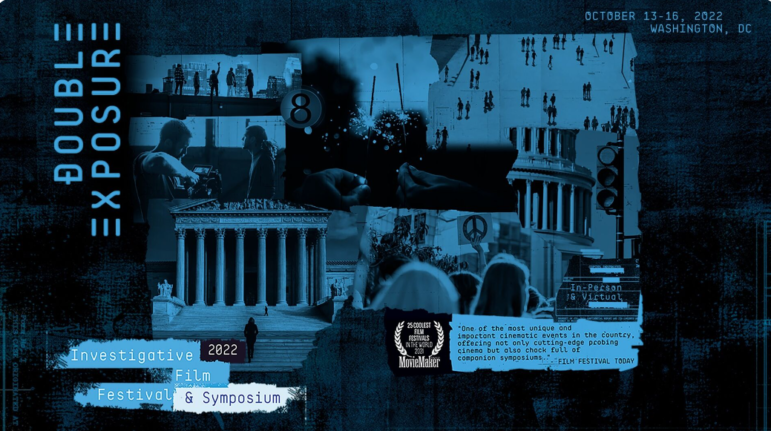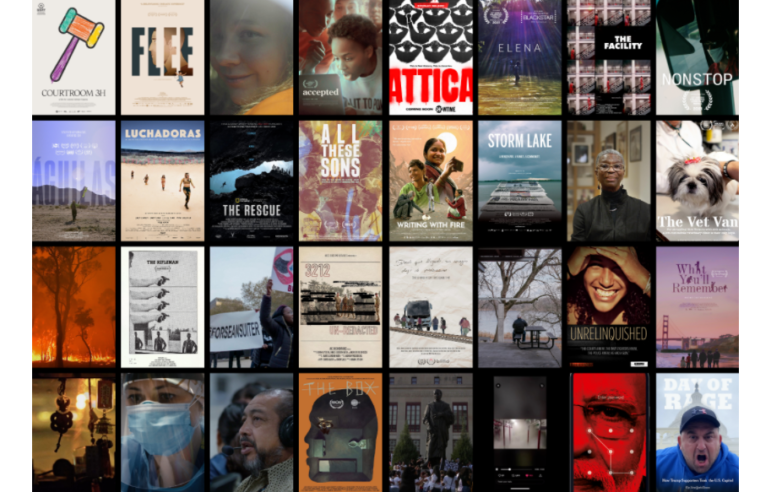

Image: Courtesy of Double Exposure Film Festival
2023 Double Exposure Festival Highlights the Global Fight Against Authoritarian Oppression
The Double Exposure (DX) film festival — the US’s first and, so far only, such festival dedicated to investigative reporting on film — once again showcased investigations documenting challenges to democratic ideals and human rights around the world, in both democratic and authoritarian states.
The festival, held annually in Washington, DC, hosted four days of film screenings for the public earlier this month, alongside a professional symposium that included workshops and discussions of topical issues ranging from best practices for working with diverse reporting teams and the implications of AI and deepfakes for documentary.
This year’s cohort of films illuminate different fronts in the global backsliding of human rights and press freedom, in the aggregate revealing nowhere should we take our freedoms — and the methods for defending them — for granted: Wall Street hedge funds plundering newspaper chains for profit; mass surveillance efforts under the UK’s broad anti-terror laws; the shuttering and exiling of independent media in Russia; the limitations of international justice and institutions in prosecuting the Syrian state. But these films also show that attempts to stifle watchdog journalism have not succeeded in muting powerful reporting and effective storytelling from those who question people in power.
Here are six notable films from the DX Festival’s 2023 edition, for which GIJN counts itself among the proud partners.
‘One Bullet’
This film, by Academy Award-winning filmmaker Carol Dysinger, shifts between timelines in Afghanistan in 2005, 2010, and 2021, telling the story of four decades of war through one lethal stray bullet, its effect on a family, and Dysinger’s friendship with an Afghan woman.
In 2005, Dysinger started working on her 2010 documentary, “Camp Victory, Afghanistan,” about US National Guard soldiers’ attempts to train a modern Afghan army. While she was embedded with international forces, the unit’s colonel was assigned to investigate the shooting of a 16-year-old Afghan boy, Fahim, who was struck by a bullet in front of his home. During the editing process for “Camp Victory,” Dysinger was haunted by an image of Fahim and decided to dig deeper into what happened to him. She approached Fahim’s mother, Bibi Hajji, and over many years, the two women formed a deep friendship that, on film, intimately conveys the domestic consequences of the US’s longest war. Who fired the shot that paralyzed Fahim is never resolved — although “One Bullet” is also framed as a procedural attempting to do so — but the film explores loss and fortitude across cultural and linguistic divides.
‘Stripped for Parts: American Journalism on the Brink‘
In 2011, a Wall Street hedge fund started buying up chains of newspapers across the US. The fund profited while eroding the newsrooms — stripping newspapers of real estate assets and gutting newsroom staff. In 2015, reporter Julie Reynolds began investigating the secretive hedge fund that had bought her small-town daily; her reporting on its predatory methods was picked up by other media nationwide.
“Stripped for Parts” portrays the methodology of investigative reporting and profiles intrepid journalists who fought back to defend local journalism. The business model of today’s newspapers is faltering for many reasons — but in this film, greed and vulture capitalism are apportioned significant blame. “It’s not good enough to say it’s going away because that’s how business works,” the trailer voiceover states of journalism’s role. “Newspapers are not just any other business. They are the only private industry specifically named in the Bill of Rights.”
‘All Static & Noise‘
According to human rights organizations, around one million Uyghurs — an ethnic minority in China, many of whom are practicing Muslims — have been arbitrarily detained in a large network of internment camps, which the Chinese government calls “re-education” centers. The Uyghur language has been banned in schools in China, and Uyghur books and films have been censored. In 2021, leaked Chinese police files provided details from inside camps where Uyghurs were being held, revealing harrowing details of their treatment there.
“All Static & Noise,” directed by David Novack, primarily follows two Uyghurs in the diaspora: Jewher Ilham, born and raised in China until her exile at 18, who now lives in the US (her father, Ilham Tohti, an economist and co-founder of the Uyghur Online website, is serving a life sentence in China on separatism charges); and linguist and poet Abduweli Ayup, who left China in 2015 for Turkey before relocating to Norway. Both express deep pride in their roots and try to maintain their cultural identity as best they can in their adopted countries.
‘Phantom Parrot’
Kate Stonehill’s film takes as its starting point the UK’s Terrorism Act 2000 — and the alarmingly broad interpretation of powers the law enables. Schedule 7 of the Act, for example, empowers authorities to stop and search people at border control and request personal information such as device passwords without a warrant — and charge them with an offense under Schedule 7 if they refuse. (The term “phantom parrot” refers to a surveillance program — outlined in a leaked document from GCHQ, the UK’s largest intelligence agency — that involves detaining people at the border under Schedule 7 with the explicit intention of downloading their data.)
Stonehill explores the case of Muhammad Rabbani — the managing director of CAGE, a London-based human rights advocacy organization, formed in 2003 in response to the treatment of prisoners in the US government’s Guantanamo Bay detention facility. On Rabbani’s way back to the UK from Doha — where he had been taking testimony from a Qatari national who claimed he had been arrested and tortured on US soil — he was questioned for hours and asked to give up his phone password and PINs. When he refused, he was charged under Schedule 7. But unlike most travelers, he was intimately familiar with the law under which he was stopped. (The information on his phone included documents that would later form part of a CAGE campaign highlighting allegations of FBI involvement in torture.)
‘The Price of Truth’
Directed by Patrick Forbes, this film profiles Russian journalist Dimitry Muratov, who in 2021 was awarded the Nobel Peace Prize for his work at Novaya Gazeta, a Moscow-based publication he founded in 1993. Soon after, Muratov sold his Nobel medal at auction in New York and used the profits to provide aid to Ukrainian refugees.
The danger of reporting in Russia is acute. Several of Novaya Gazeta’s journalists have been killed since 2000; others were sent menacing funeral wreaths. After the invasion of Ukraine in February 2022, the threats of censorship and to journalists’ safety increased. Dozens of media outlets have been shuttered or forced into exile after being branded “foreign agents” or “undesirable organizations.”
“This is a historic tragedy created by Vladimir Putin,” Muratov states in the film. “It’s very important that people who oppose the war have their own voice.” Muratov himself was paint-bombed in April 2022 by a member of a military veteran group; it damaged tissue in his eyes and eyelids. Muratov relocated his paper’s headquarters to Latvia, and relaunched it in April 2022 as Novaya Gazeta Europe. Coinciding with Russia’s Victory Day parade on May 9, 2022, he and his team launched a YouTube channel and put out a magazine supplement — titled “No” — challenging the invasion of Ukraine. The Novaya Gazeta Europe website was swiftly blocked in Russia.
‘The Lost Souls of Syria’
“The Lost Souls of Syria” charts various attempts in European state courts to prosecute members of the Syrian regime.
In 2013, a Syrian military defector code-named “Caesar” stole more than 53,000 photos — records of the bodies of civilian detainees tortured to death in detention centers since the uprisings in 2011 — from the regime’s secret archives before fleeing Syria. The following year, these photos were made public in what is known as the Caesar Report, which focused on over 28,000 photos showing at least 6,700 detainees. In the opening scenes, Caesar — wearing a plastic facemask and gloves to project his identity — recounts his time working for the military police in Damascus, when he photographed up to 40 nameless bodies a day, identified only by their detainee number and detention center number.
These photographs have provided a form of grim closure to many Syrian citizens whose relatives had disappeared — and have formed the basis for legal proceedings against Syrian state officials. When international law and institutions proved powerless to hold the Syrian state to account, families of the disappeared — with the help of lawyers, activists, and Caesar’s evidence — have instead turned to state courts across Europe. Director Stéphane Malterre and historical advisor Garance Le Caisne tell the stories of two individuals whose dual nationalities allowed them to file landmark lawsuits in European jurisdictions against members of the Syrian regime: a Spanish-Syrian woman in Madrid whose brother was identified among the photos, and a French-Syrian man in Paris whose brother and nephew had been abducted in 2013. But cases like theirs face considerable setbacks in obtaining truth and justice.
 Sarah Moroz is a Franco-American journalist and translator based in Paris.
Sarah Moroz is a Franco-American journalist and translator based in Paris.









